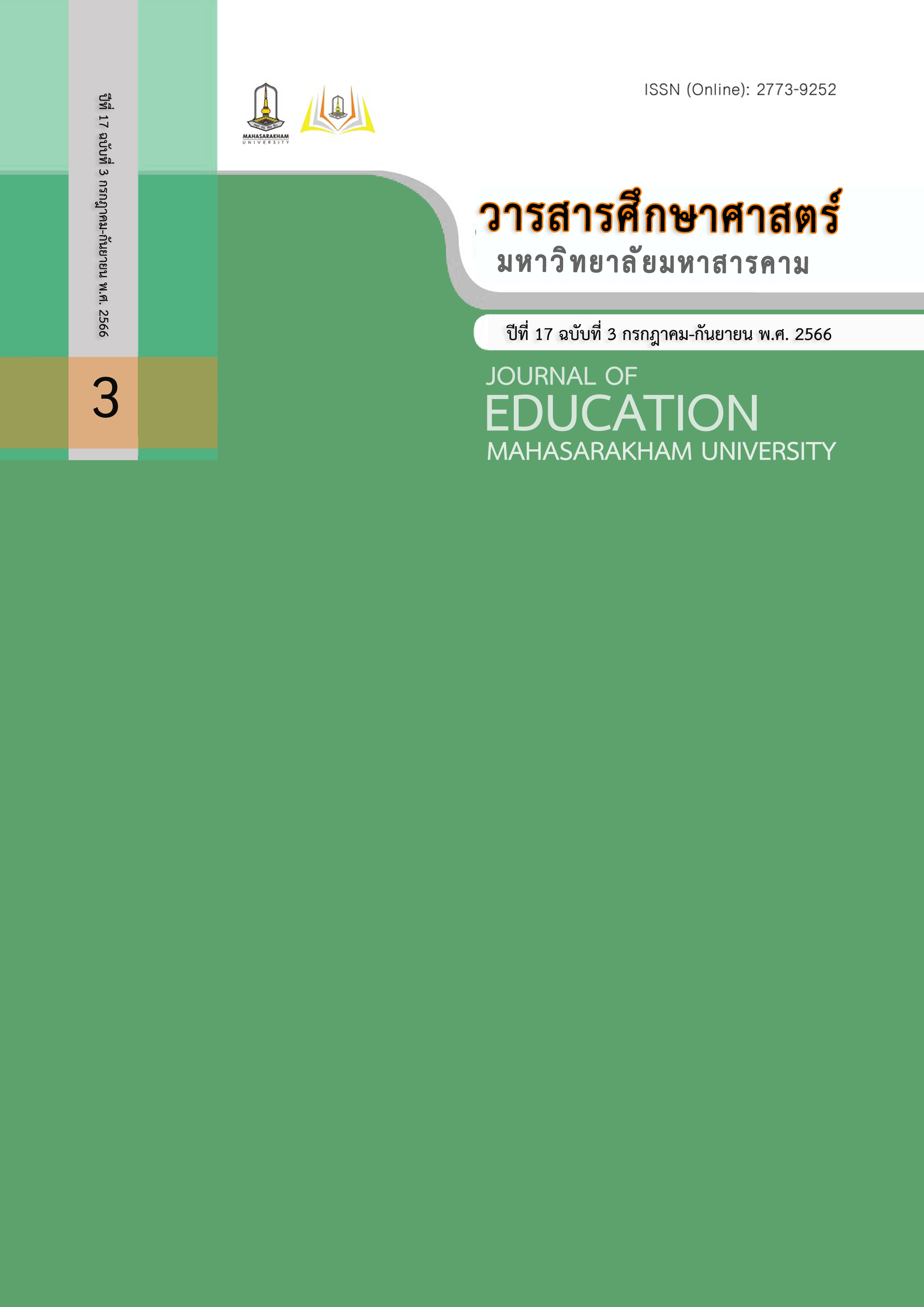The Factors Influencing Self-development of Juvenile Delinquent of Juvenile and Family Court under the Administrative Office of the Court of Justice, Region 4
Main Article Content
Abstract
This research aimed at 1) studying the level of the factors influencing self-development; 2) studying the relationship between various factors that influencing self-development; and 3) studying the predictive factors for self-development. The sample group consisted of 420 juvenile offenders of the Juvenile and Family Courts under the Administrative Office of the Court of Justice, Region 4 receiving special treatment instead of being prosecuted under Section 132, Paragraph 1, obtained by using the stratified random sampling technique. The research instruments used were 1) the general information questionnaire, 2) the 16-item self-development assessment questionnaire with discrimination from 0.33 to 0.62 and a reliability coefficient of 0.86, 3) the 8-item self-efficacy assessment questionnaire with discrimination from 0.32 to 0.57 and a reliability coefficient of 0.75, 4) the 10-item achievement motivation assessment questionnaire with discrimination from 0.44 to 0.57 and a reliability coefficient of 0.81, 5) the 10-item self-confidence assessment questionnaire with discrimination from 0.33 to 0.68 and a reliability coefficient of 0.78, 6) the 8-item self-control assessment questionnaire with discrimination from 0.37 to 0.64 and a reliability coefficient of 0.81, and 7) the 9-item optimism assessment questionnaire with discrimination from 0.36 to 0.72 and a reliability coefficient of 0.82. The statistical analysis techniques used to analyze the data included percentages, means, standard deviations, Pearson correlation analysis, and multiple regression analysis.
The research found that 1) the factors influencing self-development and self-development were all high, 2) the correlation between the factors influencing self-development and self-development had a positive correlation with self-development at statistical significance of .01 level, and 3) the causal factors influencing self-development consisted of achievement motivation, self-control, self-confidence, and optimism with the beta weight of 0.28, 0.21, 0.19 and 0.18 respectively. All causal factors could jointly explain the self-development variance at 54 percent. And the forecast equation was as follows: Z’Y= .28(ZX2) +.19(ZX3)+.21(ZX4) +.18(ZX5)
Downloads
Article Details

This work is licensed under a Creative Commons Attribution-NonCommercial-NoDerivatives 4.0 International License.
References
จำนงค์ แจ่มจันทรวงศ์ และคณะ. (2560). ปัจจัยที่ส่งผลต่อสมรรถนะครูผู้สอนของนักศึกษาหลักสูตรประกาศนียบัตรบัณฑิต สาขาวิชาชีพครู วิทยาลัยเชียงราย. วารสารมหาวิทยาลัยศิลปากร, 10(1). 269-280. https://he02.tci-thaijo.org/index.php/Veridian-E-Journal/article/view/85541/68048.
ธนัญญา คนอยู่. (2547). ปัจจัยเชิงสาเหตุที่ส่งผลต่อความเชื่อมั่นในตนเองของนักเรียนมัธยมศึกษาปีที่ 3 ในเขตพื้นที่การศึกษากรุงเทพมหานคร เขต 3. วารสารการวัดผลการศึกษา. 38(103). 158-170. https://so06.tci-thaijo.org/index.php/JEMEPTB/article/view/249825/169076.
นิตยา กัณณิกาภรณ์. (2553). การศึกษาปัจจัยบางประการที่ส่งผลต่อการพัฒนาตนเองตามจรรยาบรรณวิชาชีพครูของข้าราชการครู สังกัดกรุงเทพมหานคร.
[ปริญญานิพนธ์ กศ.ม., มหาวิทยาลัยศรีนครินทร์วิโรฒ]. http://thesis.swu.ac.th/swuthesis/Ed_Re_Sta/Nittaya_K.pdf.
เนาวรัตน์ ไตรยงค์. (2552). ปัจจัยทางจิตสังคมที่เกี่ยวข้องกับพฤติกรรมการพัฒนาตนเองให้รอบรู้ของนักเรียนช่วงชั้นที่ 2 สังกัดสำนักงานเขตพื้นที่การศึกษาศรีสะเกษ เขต 3. [ปริญญานิพนธ์ กศ.ม. ไม่ได้ตีพิมพ์]. มหาวิยาลัยบูรพา.
เบญจพร ปัญญายง. (2555). กระบวนการนิติจิตเวชสำหรับเด็กและเยาวชน (พิมพ์ครั้งที่ 1). นนทบุรี: กรมสุขภาพจิต.
ปรียาพร วงศ์อนุตรโรจน์. (2535). จิตวิทยาการบริหารงานบุคคล. กรุงเทพฯ: ศูนย์ส่งเสริมกรุงเทพ.
พัชรินทร์ ซำศิริพงษ์. (2561). การกระทำผิดซํ้าของเด็กและเยาวชนในคดียาเสพติด. วารสารวิจัยราชภัฏกรุงเก่า. 5(3), 23-30. https://so01.tci-thaijo.org/index.php/rdi-aru/article/view/212899/148208.
เมธาวดี สังขะมาน. (2548). ตัวแปรคัดสรรที่สัมพันธ์กับความสามารถในการเผชิญปัญหาและฝ่าฟันอุปสรรคของนักเรียนช่วงชั้นที่ 4 จังหวัดหนองคาย ปีการศึกษา 2547. วารสารการวัดผลการศึกษา มหาวิทยาลัยมหาสารคาม. 22(1). 287-297. https://journal.oas.psu.ac.th/index.php/asj/article/viewFile/804/830.
เรียม ศรีทอง. (2542). พฤติกรรมมนุษย์กับพัฒนาการ: ศาสตร์แห่งการพัฒนาชีวิตและสังคม. กรุงเทพฯ: บริษัท เธิร์ดเวฟเอ็ดดูเคชั่น จำกัด.
วาสนา จันทร์จ่าย. (2553). การศึกษาปัจจัยบางประการที่ส่งผลต่อการพัฒนาตนเองของนักศึกษามหาวิทยาลัยราชภัฏสวนดุสิต. [ปริญญานิพนธ์ กศ.ม., มหาวิทยาลัยศรีนครินทร์วิโรฒ]. https://so03.tcithaijo.org/index.php/jopag/article/view/248842/167521.
ศาลเยาวชนและครอบครัวกลาง. (2559). คู่มือมาตรฐานงานนักจิตวิทยาศาลเยาวชนและครอบครัว. กรุงเทพฯ: สำนักงานศาลยุติธรรม.
สงวน สุทธิเลิศอรุณ. (2545). พฤติกรรมมนุษยกับการพัฒนาตน. กรุงเทพฯ : อักษราพิพัฒน์.
สุพล มูลศรี. (2556). ปัจจัยที่ส่งผลต่อการพัฒนาตนเองของนักเรียนมัธยมศึกษาปีที่ 6 สำนักงานเขตพื้นที่การศึกษามัธยมศึกษา เขต 19. [ปริญญานิพนธ์ กศ.ม. การวิจัยการศึกษา, มหาวิทยาลัยมหาสารคาม]. https://www.slideshare.net/peerawit2/titlepage-37049953.
สุรินทร์ บู่สาลี. (2545). การพัฒนาตนเองตามเกณฑ์มาตรฐานวิชาชีพครูของข้าราขการครูโรงเรียนวัดพรหมสุวรรณสามัคคี. [วิทยานิพนธ์ กศ.ม ไม่ได้ตีพิมพ์]. สถาบันราชภัฏบ้านสมเด็จเจ้าพระยา.
สำนักงานศาลยุติธรรม. (2563). รายงานสถิติคดีของศาลยุติธรรมประจำปี 2563. สำนักแผนงานและงบประมาณ สำนักงานศาลยุติธรรม. สืบค้นออนไลน์ https://oppb.coj.go.th/th/content/category/detail/id/8/cid/2085/iid/196196.
_______. (2562). รายงานสถิติคดีของศาลยุติธรรมประจำปี 2562. สำนักแผนงานและงบประมาณ สำนักงานศาลยุติธรรม. สืบค้นออนไลน์ https://oppb.coj.go.th/th/content/category/detail/id/8/cid/2085/iid/196196.
อรพลอย เกษมสันต์ ณ อยุธยา. (2546). การศึกษาเปรียบเทียบการควบคุมตนเอง และมโนภาพแห่งตนของนักศึกษาวัยรุ่นที่อาศัยอยู่ในหอพักกับนักศึกษาวัยรุ่นที่อาศัยอยู่ตามบ้าน. [ปริญญานิพนธ์ กศ.ม. ไม่ได้ตีพิมพ์]. มหาวิทยาลัยศรีนครินทร์วิโรฒ.
อรพินทร์ ชูชม. (2544). จากทฤษฎีสู่แนวปฏิบัติในการมองโลกในแง่ดี. วารสารพฤติกรรมศาสตร์. 7(1).
อรรณพ จีนะวัฒน์. (2559). การพัฒนาตนของผู้ประกอบวิชาชีพครู. วารสารวิชาการมหาวิทยาลัยศิลปากร. 9(2).
อรัญญ์ชยาต์ บุญชูกิตติยศ และคณะ. (2562). ปัจจัยคัดสรรที่สัมพันธ์กับพฤติกรรมที่เป็นปัญหาในวัยรุ่น : การวิเคราะห์จำแนกกลุ่มระหว่างกลุ่มวัยรุ่นที่กระทำความผิดกับกลุ่มนักเรียนวัยรุ่นตอนปลาย. วารสารกระบวนการยุติธรรม. 12(1), 63-85.
อัจศรา ประเสริฐสิน. (2556). การพัฒนาตนเองสำคัญอย่างไรในชีวิตและการทำงาน. วารสารมหาวิทยาลัยราชภัฏสกลนคร, 5(10), 73-84.
Caldwell and Hayes. (2016). Self-efficacy and self-awareness: moral insights to increased leader effectiveness. Journal of Management Development. 35(9).


